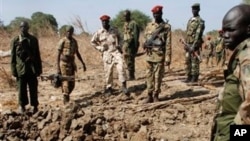Six years after the end of Sudan's civil war, development has been slow in the south. The southern government started receiving oil revenues in 2005, but has been forced to spend the money to keep the peace in the south.
According to Abdon Agau, the head of the southern government's civil service, the southern government has focused on keeping the peace in the south. There is a long list of disgruntled former southern rebels who have turned against the southern ruling party. They have often spearheaded their own military campaigns against the government in the semi-autonomous south.
"In order for peace itself to be maintained the government has always said it is necessary to address political problems and pay for those solutions," said Agau.
According to Agau, investments in infrastructure and services have suffered because of the focus on ensuring political stability. The most well-known example of the southern government paying for peace is the 2006 Juba peace agreement.
Shortly after the end of Sudan's 21-year civil war, the Sudan People's Liberation Movement came into power in the semi-autonomous south. The SPLM is made up of many of the rebel army's leaders.
One of the SPLM's earliest achievements was bringing back into the army a handful of militias and breakaway factions through the Juba agreement. Agau says it was a huge step towards the creation of a stable south.
"It will account for our ability to resist any attempts to derail Southern Sudan," said Agau.
It also drastically increased the size of the southern army.
According to a report from the Geneva-based Small Arms Survey, as many as 50,000 soldiers were added to the army's payroll. Almost a quarter of the government's budget in 2010, around $440 million, went to the army. Nothing comes even close to what was budgeted for the army.
The April general elections in Sudan, which were deeply flawed, led to a number of new rebellions in the south. The southern government responded by offering amnesty to the participants and accepting the soldiers back into the army.
Most accepted, though forces loyal to George Athor, allegedly ambushed southern soldiers in Jonglei state on Saturday, killing 20.
Despite what happened after the last election, Agau says the south will enjoy stability after its likely independence because it will be a democracy.
"We have over 20 political parties in Southern Sudan. Each of these parties will struggle to win the support of the people of Southern Sudan and rule Southern Sudan," added Agau.
Southerners are expected to vote overwhelmingly in favor of independence in a January 9 referendum. Leaders in the south will then meet to draft a new constitution and schedule elections. If they vote to separate from the north, independence is scheduled to go into effect on July 9, 2011.


















